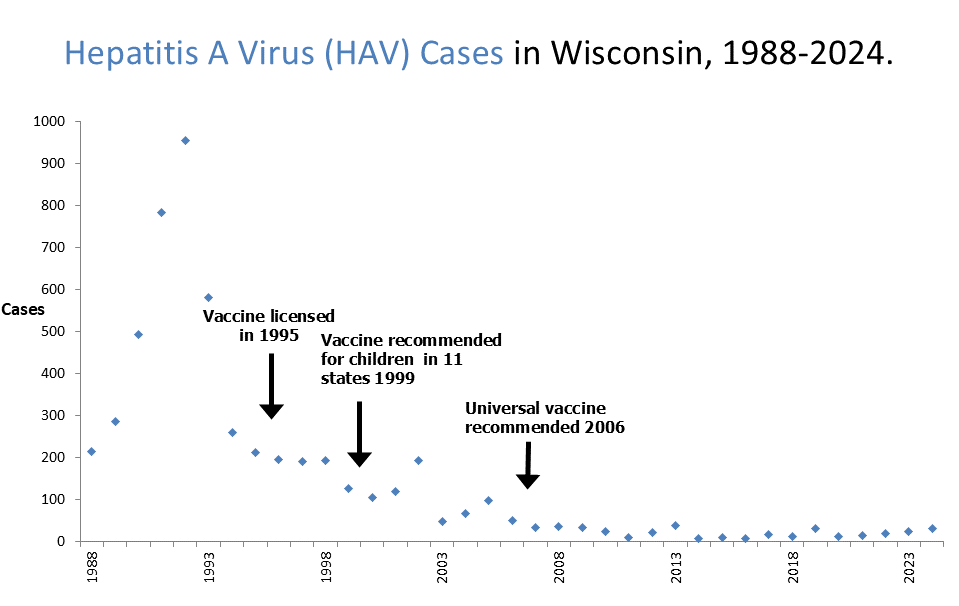Hepatitis A Virus Infection
Hepatitis A is a liver infection that is caused by the hepatitis A virus. Anyone can get hepatitis A, but children and people who live in, or travel to, countries where hepatitis A is common are more likely to get it. Once you have had hepatitis A, you cannot get sick from it again.
Approximately 10–30 cases of hepatitis A are reported in Wisconsin each year. Hepatitis A rates in the U.S. have declined by more than 95% since the hepatitis A vaccine first became available in 1995. There have been multi-state outbreaks in recent years.
To learn more about hepatitis A cases in Wisconsin read the Hepatitis A Surveillance Report, 2024 (PDF)
For information on hepatitis B, C, D, and E, visit our Viral Hepatitis Infections page.
About hepatitis A
Hepatitis A is spread through person-to-person contact, or by eating or drinking food or water with the hepatitis A virus in it.
Hepatitis A is found in the poop of people who have the virus. Hepatitis A can be spread when:
- Someone with hepatitis A uses the bathroom, does not wash their hands properly, and then touches objects or prepares food.
- A caregiver does not properly wash their hands after changing diapers or cleaning up the poop of someone with hepatitis A.
- Someone uses drugs.
- Food or water has the hepatitis A virus. This most often happens in countries where hepatitis A is common.
- Someone has sexual contact with an infected person.
Symptoms usually start about four weeks after the hepatitis A virus enters your body. However, they can start between two and seven weeks after the virus enters your body.
Hepatitis A can develop over several days, and usually lasts less than two months, but may last as long as six months.
Some people with hepatitis A do not have any symptoms. Infants and young children tend to have very mild or no symptoms. People can spread the disease for two weeks before symptoms show up.
Common signs and symptoms of hepatitis A
- Fever
- Tiredness
- Loss of appetite
- Nausea and/or vomiting
- Stomach pain
- Dark urine (pee)
- Grey-colored poop
- Joint pain
- Jaundice (yellowing of the skin and whites of the eyes)
There are no medicines that specifically treat hepatitis A. Eating well, getting enough rest, and drinking fluids are usually what is needed to recover.
Some people may need to be hospitalized, but people rarely die from hepatitis A.
- The single best way to prevent a hepatitis A infection is by getting vaccinated against the virus. The vaccine is recommended for all children one year of age or older and other groups of people who are at high risk for getting hepatitis A. These groups include:
- Travelers to countries where hepatitis A is common. Visit the CDC (Centers for Disease Control and Prevention) Hepatitis A webpage for more information on hepatitis A and international travel.
- Family and caregivers of those from countries where hepatitis A is common.
- People with chronic or long-term liver disease.
- Men who have sexual contact with other men.
- Users of recreational drugs, whether injected or not.
- People with blood clotting disorders.
See the CDC Hepatitis A Vaccine Information Statement for more information.
- It is always important to wash your hands properly after using the toilet, changing diapers, and before touching any food. Check out our Wash Your Hands! P-01710, fact sheet for information on proper handwashing techniques.
- People who have been exposed to hepatitis A should get one dose of the vaccine or immune globulin as soon as possible, but not more than 14 days after they were exposed. People who have been in close contact with someone who has hepatitis A should talk with their doctor as soon as possible to see if they should get the vaccine.
Fact sheets and flyers
- Hepatitis A Fact Sheet, P-42054 (Multiple Languages): Educational fact sheet for the general public on hepatitis A, covering signs and symptoms, treatment, and prevention. *Not available for order.
- Hepatitis A: Just the Facts, P-02401 (Multiple Languages): Highly visual educational flyer for the general public on hepatitis A, covering high risk groups, signs and symptoms, and prevention. *(English, Spanish, and Hmong available to order)
- Wash Your Hands!, P-01710 (Multiple Languages): Educational fact sheet for the general public on proper handwashing techniques.
- Hepatitis A Outbreak-Protect Yourself By Getting Vaccinated (PDF): Poster that includes information on vaccination for high risk groups.
- Hepatitis A Outbreak-What Emergency Departments Can Do (PDF): Poster that includes information on what emergency departments can do related to Hepatitis A outbreaks.
Webpages
- CDC Hepatitis A webpage: webpage including information on symptoms, transmission, and prevention.
- Hepatitis A Resources: CDC webpage containing resources for patients and their families.
- Local Health Departments as Leaders in the Prevention & Elimination of Viral Hepatitis: NACCHO webpage including information on activities, services, funding, barriers, and needs.
Looking to order the printed materials listed in this section?
- Go to the DHS Publication Ordering webpage.
- Fill out the DHS Publication Order Form (F-80025A).
- Complete the form by tabbing through the input fields, NOT by using the return/enter key. Note: Order only a three-month supply.
- From the toolbar, choose File, Save As, give the document a name, and save it to a location on your computer that you will remember. Close the file.
- After the form is completed, email it as an attachment to dhsfmorder@dhs.wisconsin.gov.
- If you are unable to place your order electronically or have questions, call 608-266-8502 or email the DHS Forms Center at dhsfmorder@dhs.wisconsin.gov.
Provider information
This is a Wisconsin disease surveillance category I disease:
- Health care providers should report IMMEDIATELY by TELEPHONE to the patient's local public health department upon identification of a confirmed or suspected case.
- Report to the patient's local public health department electronically, through the Wisconsin Electronic Disease Surveillance System (WEDSS), by mail or fax using an Acute and Communicable Disease Case Report, F-44151 (Word), or by other means within 24 hours upon recognition of a case.
Information on communicable disease reporting
Wisconsin case reporting and public health follow-up guidelines:
- Hepatitis A EpiNet, P-01915 (PDF): Hepatitis A case reporting and investigation protocol for health professionals.
- Viral Hepatitis Case Report Form, F-02241 (PDF): Hepatitis A worksheet, confirmed and suspected cases.
- Hepatitis A Handbook for Public Health Personnel, P-01745 (PDF)
- Hepatitis A Information for Health Professionals (CDC)
- Hepatitis A Timeline Calculator (Federal Bureau of Prisons)(Excel): Spreadsheet to help determine exposure period, infectious period, and incubation period.
- Hepatitis A Outbreak-What Emergency Departments Can Do (PDF): CDC Poster that includes information on how emergency departments can do related to Hepatitis A outbreaks.
Questions about hepatitis A virus infection? Contact us!
Phone: 608-267-9003 | Fax: 608-261-4976
Wisconsin Local Health Departments – Regional offices – Tribal agencies



